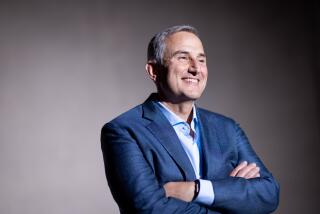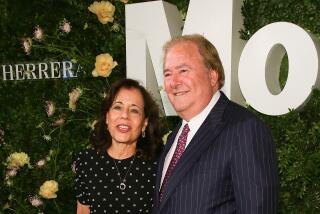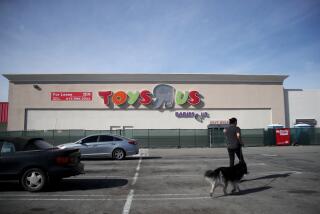Eugene Kleiner, 80; Funded High-Tech Firms
- Share via
Eugene Kleiner, who fled his native Austria ahead of the Nazis and later found what became perhaps the world’s most admired venture capital firm, has died.
Kleiner, 80, died of heart failure Thursday in the Los Altos Hills home he built above Silicon Valley, his family said.
As part of the team at Shockley Labs that launched the digital age by putting multiple transistors on a silicon chip, Kleiner moved from his engineering career to launch Kleiner, Perkins, Caulfield & Byers in 1972.
Begun with a then-record $8 million, the Menlo Park firm quickly became one of the best-known investors in technology, providing initial funding for Tandem Computer, Genentech Inc., America Online Inc., Amazon.com and more than 300 other companies.
“They didn’t just hand money to entrepreneurs,” Kleiner’s son, Robert, said Tuesday. “They really mentored, and that was quite different than the type of thing you saw with investment banking.”
Kleiner left Vienna with his family in 1938 as the German occupation began. In his teenage years, the family traveled through France, Belgium and Portugal before settling in New York. After serving in the U.S. Army, Kleiner used the GI Bill to earn a bachelor of science degree in mechanical engineering from Brooklyn Polytechnic, now called Polytechnic University of New York.
In 1956, Kleiner left a job at Western Electric to join a band of engineers working for Nobel Prize-winner William Shockley at his transistor lab in Palo Alto near Stanford University.
A year later, Kleiner and seven colleagues decided to strike out on their own. Using $3,500 of their own money, the eight developed a way to manufacture multiple transistors on a single silicon wafer.
Unsure how to proceed, the entrepreneurs brainstormed about contacts in the financial world. Kleiner had the best lead, albeit a slim one: His father had a brokerage account at the New York investment firm of Hayden, Stone & Co.
And so Kleiner wrote what came to be known as the letter that changed the world. It was addressed to his father’s stockbroker and wound up in the hands of a junior Hayden Stone employee named Arthur Rock. Rock and a senior partner called 35 public companies they thought might be interested in backing the group that came to be dubbed the “Traitorous Eight.”
When none were willing to finance a new firm, Rock persuaded wealthy industrialist and inventor Sherman Fairchild to set up a subsidiary called Fairchild Semiconductor. That company began Silicon Valley’s long love affair with chips, transforming a region previously known for fruit orchards into a proving ground for cutting-edge technologies. The inventions made possible by chips -- including desktop computers, cell phones and hand-held organizers -- drove much of the nation’s productivity boom from the 1960s on.
Kleiner later said his chance connection with Rock had been the sort of luck that often makes the difference in the lives of people, firms and ideas.
“He was a great believer in luck, of the importance in being in the right place at the right time as part of one’s success,” Robert Kleiner said.
The engineers who started at Fairchild peeled off over the years to form most of the major chip companies in the valley, including National Semiconductor Corp. and Intel Corp.
Not long after helping to finance Intel, Kleiner began to feel that he was ready to move on from engineering. In 1972, he told Bay Area investment banker Sandy Robertson that he wanted to open a venture capital firm. Robertson introduced him to Thomas Perkins, who had run the computer business of Hewlett-Packard Co. and also was interested in starting a venture firm.
“Sandy said you are the same kind of guys, you really ought to get together,” Perkins recalled Tuesday. “Neither of us wanted to combine, and it was reluctantly and only as a courtesy to Sandy Robertson that we got together for breakfast at the Hyatt Rickey’s in Palo Alto.”
That Friday breakfast lasted until lunch, and the two men spent most of the weekend together talking before deciding to join forces.
Of the pair, Kleiner was more reserved and introspective, but “we both worked together in everything,” Perkins said. “If we didn’t agree 100%, we didn’t do it.”
Kleiner Perkins invested in some firms that did terribly, including a manufacturer of a combination snowmobile and motorcycle. But its leaders formalized the venture capital field when it was very young, and Kleiner is credited with crafting a number of maxims. Among them: “Never sell unless there are two buyers,” and “There is a time when panic is the correct response.”
By 1997, the partnership had backed companies whose combined stock market value topped $100 billion.
At Kleiner Perkins, Kleiner led the investments in Genentech, the first major biotech firm, and in Tandem, which was bought years later by Compaq Computer Corp. He remained active in daily decisions at the venture firm until 1981, and he continued to advise the firm and its portfolio of companies well after that.
Kleiner was an active supporter of his college and of Jewish causes. His wife Rose, a refugee from Nazi-occupied Poland whom he married in 1947, died in 2001.
Besides his son, Kleiner is survived by a daughter, Lisa Kleiner Chanoff, and four grandchildren.
A memorial service will be held at 1 p.m. Dec. 5 at Congregation Beth Am, 28790 Arastradero Road, Los Altos Hills. In lieu of flowers, the family asks that donations be made to Polytechnic University.
More to Read
Inside the business of entertainment
The Wide Shot brings you news, analysis and insights on everything from streaming wars to production — and what it all means for the future.
You may occasionally receive promotional content from the Los Angeles Times.










